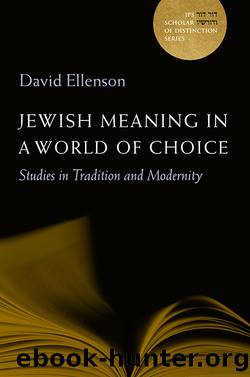Jewish Meaning in a World of Choice by David Ellenson

Author:David Ellenson [Ellenson, David]
Language: eng
Format: epub
Tags: REL040000 Religion / Judaism / General
ISBN: 9780827611832
Publisher: University of Nebraska Press
Published: 2014-07-31T00:00:00+00:00
When persons will not speak with the other, a dehumanization of the other easily arises and a demonization results. As a committed Jew, not only the past history of Jewish-Christian relations but recent events like the slaughter of Muslims engaged in prayer in Hebron in 1994 and the assassination of Prime Minister Yitzhak Rabin in 1995 all too painfully remind me of the tragedy that can ensue when the path of dialogue is not taken.
Colloquia and meetings like the one analyzed in this paper are more than exercises in which the identity of all those who participate is both strengthened and reformulated in the meeting with the other. They also embody additional moral and religious dimensions. By confronting the other in his or her full integrity as a person embedded in tradition, weâas persons informed by and conscious of the imperatives of the modern worldâare each reminded of the ineffability of God and of the mystery and infinity that lie at the heart of religion and culture, history and memory. Our traditions and our symbols as well as our ritualsâconstructed and mediated as we are aware they are through human agencyâare fragile and tentative gropings for the reality of the divine whose presence they purport to represent in the world. They are all penultimate. They point toward, but do not fully contain, the Divine, Whose plenitude is beyond all words and rituals. The Colloquium and the setting of interreligious learning it fostered teach us a great deal about how religious identity is constructed and transformed. More importantly, it testifies that members of each tradition can learn from one another even as the uniqueness of each communityâs own memory and identity are asserted and affirmed.
The enterprise of interreligious learning, so assessed, reflects more than the social dynamics involved in the process of forging a particular communityâs sense of religious identity. It also contributes to the creation of an atmosphere of mutual respect between former rivals who were all too often actual foes. Interreligious learning, carried out in the manner of the Catholic-Jewish Colloquium, permits its participants to forge a new sense of religious identity. It allows the Jew to assert, as Eugene Borowitz did in Contemporary Christologies over a decade ago, âTo be sure, I see a substantial difference between my faith and that of the [Christian] theologians I have studied here, but I cannot say that their wisdom is only âhuman wisdom.â They know a great deal about the God of my people and their knowledge has consequences for their lives [as well as my own] in ways . . . which are recognizably directed to Godâs serviceâ (Borowitz 1980, 190).
Note
1. âThe Dynamics of Interreligious Learningâ in Religious Education 91 (Fall 1996): 420â66.
Download
This site does not store any files on its server. We only index and link to content provided by other sites. Please contact the content providers to delete copyright contents if any and email us, we'll remove relevant links or contents immediately.
Getting It, Then Getting Along by L. Reynolds Andiric(650)
Religion and Politics Beyond the Culture Wars : New Directions in a Divided America by Darren Dochuk(558)
Global Justice, Christology and Christian Ethics by Lisa Sowle Cahill(428)
Positive Psychology in Christian Perspective: Foundations, Concepts, and Applications by Charles Hackney(353)
Forgiveness and Christian Ethics by Unknown(342)
Douglas Hamp The First Six Days by Unknown(291)
The Horrors and Absurdities of Religion by Arthur Schopenhauer(268)
Insurgency, Counter-insurgency and Policing in Centre-West Mexico, 1926-1929 by Mark Lawrence(253)
Middle Eastern Minorities: The Impact of the Arab Spring by Ibrahim Zabad(245)
Christian Martyrdom and Christian Violence by Matthew D. Lundberg;(240)
Beyond Heaven and Earth by Gabriel Levy(231)
God and Eros by Patterson Colin;Sweeney Conor;(229)
The Oxford Handbook of Greek and Roman Mythography by R. Scott Smith;Stephen M. Trzaskoma;(228)
The Bloomsbury Reader in Christian-Muslim Relations, 600-1500 by David Thomas;(223)
Autobiography, Volume 2: 1937-1960, Exile's Odyssey by Mircea Eliade(215)
Witches: the history of a persecution by Nigel Cawthorne(211)
Cult Trip by Anke Richter(208)
An Introduction to Kierkegaard by Peter Vardy(197)
The Myth of Disenchantment by Jason A. Josephson-Storm(189)
